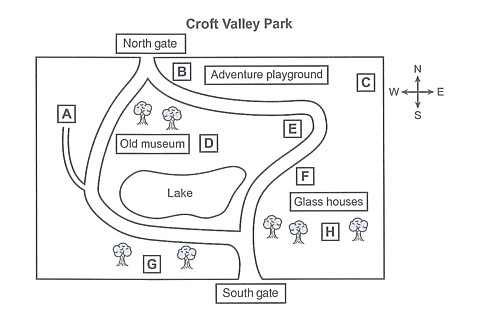Part 1: Questions 1-10
Complete the notes below. Write ONE WORD AND/ OR A NUMBER for each answer.
Customer Satisfaction Survey
Customer details
Name: Sophie Bird
Occupation: (1) __________
Reason for travel today: (2) __________
Journey information
Name of station returning to: (3) __________
Type of ticket purchased: standard (4) __________ ticket
Cost of ticket: (5) £__________
When ticket was purchased: yesterday
Where ticket was bought: (6) __________
Satisfaction with journey:
Most satisfied with: the WIFI
Least satisfied with: the (7) __________ this morning
Satisfaction with station facilities
Most satisfied with: how much (8) __________ was provided
Least satisfied with: lack of seats, particularly on the (9) __________
Neither satisfied nor dissatisfied with: the (10) __________ available
Part 2: Questions 11-20
Questions 11-16. Label the map below. Write the correct letters A-H next to questions 11-16.

11. café _____
12. toilets_____
13. formal gardens_____
14. outdoor gyms_____
15. skateboard ramp_____
16. wild flowers_____
Questions 17 and 18
Choose TWO letters A-E. What does the speaker say about the adventure playground?
A. children must be supervised
B. it costs more in winter
C. some activities are only for younger children
D. no payment is required
E. it was recently expanded
Questions 19 and 20
Choose TWO letters A-E.
What does the speaker say about the glass houses?
A. they are closed at weekends
B. volunteers are needed to work there
C. they were badly damaged by fire
D. more money is needed to repair some of the glass
E. visitors can see palm trees from tropical regions
Part 3: Questions 21-30
Questions 21-24. Choose the correct letter A, B or C.
Presentation about refrigeration
21. What did Annie discover from reading about icehouses?
A. why they were first created
B. how the ice was kept frozen
C. where they were located
22. What point does Annie make about refrigeration in ancient Rome?
A. it became a commercial business
B. it used snow from nearby
C. it took a long time to become popular
23. In connection with modern refrigeration both Annie and Jack are worried about
A. the complexity of the technology
B. the fact that some are disposed of irresponsibly
C. the large number that quickly break down
24. What do Jack and Annie agree regarding domestic fridges?
A. they are generally good value of money
B. there are plenty of useful variations
C. they are more useful than other domestic appliances
Questions 25-30
Who is going to do research into each topic? Write the correct letter A-C next to questions 25-30.
Topics 25. the goods that are refrigerated _____ 26. the effects on health_____ 27. the impact on food producers_____ 28. the impact on cities_____ 29. refrigerated transport_____ 30. domestic fridges_____ | People A. Annie B. Jack C. both Annie and Jack |
Part 4: Questions 31-40
Complete the notes below. Write ONE WORD ONLY for each answer.
How the Industrial Revolution affected life in Britain
19th century
• For the first time, people’s possessions were used to measure Britain’s (31) __________
• Developments in production of goods and in (32) __________ greatly changed lives
Main areas of change
Manufacturing
• The Industrial Revolution would not have happened without the new types of (33) __________ that were used then
• The leading industry was (34) __________ (its products became widely available)
• New (35) __________made factories necessary and so more people moved into towns
Transport
• The railways took the place of canals
• Because of the new transport:
o Greater access to (36) __________ made people more aware of what they could buy in shops
o When shopping people were not limited to buying (37) __________ Goods
Retailing
• The first department stores were opened
• The displays of goods were more visible:
o Inside stores because of better (38) __________
o Outside stores because (39) __________ were bigger
• (40) __________ that was persuasive became much more common
1. journalist
2. shopping
3. Staunfirth
4. Return
5. 23.70
6. Online
7. Delay
8. Information
9. Platform(s)
10. Parking
11. D
12. C
13. G
14. H
15. A
16. E
17-18. A, D
19-20. A, C
21. B
22. A
23. B
24. A
25. A
26. A
27. B
28. B
29. A
30. C
31. Wealth
32. Technology
33. Power
34. Textile(s)
35. Machines
36. Newspapers
37. Local
38. Lighting
39. Windows
40. Advertising